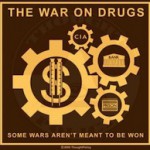The War on Drugs is perhaps the most unjust “war” ever waged. It is not, as in conventional warfare, a conflict between states, but rather a conflict of a parasite (the state) against its host (the people). Just as cancer grows by attacking its host, so too does state power expand as it attacks its citizens in the name of saving them. The tumor that is the drug war is but one variant of the cancer that is state power.
It has been said that war is the health of the state (Randolph Bourne). If that is so, then traditional wars (against people) are far too fleeting as a means to bolster state power. The end comes relatively soon as both sides are worn down through attrition. In order to have unending war the state must fight an enemy without form, substance, or soul. This is achieved by waging war against thoughts, emotions, and things; for these things can never be conquered, and thus is ensured the eternal health of the state.
The colorful imagery of a “War on Drugs” suggests perhaps we are battling against anthropomorphized weed and poppies as they brutally attempt to intoxicate us by crashing through our doors and up our noses. Yes, I’m being facetious – now I shall be sarcastic: the real criminals in this war are those who possess these vilified substances.
The police will almost never stop a murder, rape or robbery in progress, but gosh darn it they sure as heck can find a crime in progress if the crime is mere possession. What is the easiest way to capture a criminal? Declare random object X illegal and then find people who happen to possess X. Such prohibitionary lawmaking has led to a perversion of policing incentives. The police now have two choices: Demonstrate effectiveness in catching real criminals through laborious detective work that rarely pays off, or, invent new and interesting pretexts to see if dear citizen is in possession of a verboten substances. Which one is more likely to yield results? Exactly. And so focus shifts to the quick and easy result at the expense of the more difficult task of meting out authentic justice.
This truth has engendered the most sinister aspect of the drug war: the no-knock raid. If the police knock then the suspect might stealthily comply with the law and cause himself to no longer possess the banned material. So on the premise that it is better that a thousand men die than one guilty drug user go free, we have seen the birth of the no-knock raid. Yes, sometimes they’ll get the wrong house, sometimes they’ll accidentally shoot totally innocent people (or almost routinely shoot innocent dogs), but it’s all worth it if it prevents a drug possessor from sometimes getting away. No-knock raids are a breeding ground for all manner of confusion and mistakes. To wit, just last week in Cornelia, Georgia a no-knock raid resulted in a 2 year old suffering massive burns over his face and body when a “distraction device” (aka flash grenade) was tossed into his crib, inches from this face, by the invading SWAT team. Naturally this was a mistake; they never intended that to happen. Procedurally they did nothing wrong – everything was by the book. That fact alone should scare the hell out anyone. Who will be next? Maybe someone that matters to you.
Even if we were granted a wish that all recreational drugs were forever vanquished from this planet and the only price would be the life of one innocent, that price would be far too high. The irony is that those in charge of this wretched war are killing people who would never have used drugs in order to possibly save those who actively seek to use them. But what would you expect from the state? States have always sought to butcher civilians in order to persuade others to change their behavior. Sound familiar? But the ends justify the means, so that makes everything ok.
